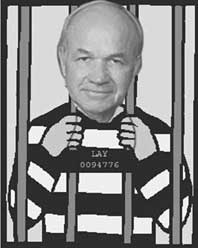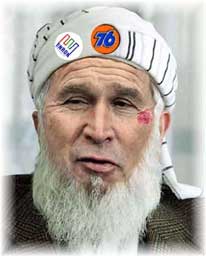
| HOME |
| NERVE |
| REVIEWS |
| ARCHIVE |
| EVENTS |
| LINKS |
| ABOUT US |
| CONTRIBUTORS |
| BACK ISSUES |
| CONTACT US |
Corporate crime stalks the globe
by Steve Tombs and Dave Whyte
 It
may have escaped many people’s notice – the world’s
attention is rather diverted by the illegal attacks on, and then occupation
of Iraq – but the fallout from the collapse of the massive energy
firm Enron rumbles on.
It
may have escaped many people’s notice – the world’s
attention is rather diverted by the illegal attacks on, and then occupation
of Iraq – but the fallout from the collapse of the massive energy
firm Enron rumbles on.
In March this year, the second in a series of reports from a US court-appointed examiner further exposed the scale of deception at Enron in a 2,000 page report. Indictments against individual employees continue – fraud, money laundering, conspiracy, obstruction of justice – as the charade that Enron’s crimes were the result of a few bad apples rather than a systematic effect of accounting and reporting practices is maintained. Still, though, the rooting out of bad apples has not extended to Kenneth Lay, friend of George Bush, or Enron’s other chief executive during the time in question, Jeffrey Skilling. Whilst the UK Government has been happy to support the Bush administration in the murderous invasion of Iraq, it is currently lined up with its European counterparts in resisting the extension of tighter US-inspired regulations on the accountancy industry. In fact, and quite incredibly, earlier this year Secretary of State for Trade and Industry Patricia Hewitt responded to a parliamentary question by noting that the Government was considering sheltering auditors from being sued for negligence – proposing that a review of company law would limit auditors' liability. Meanwhile, company after company continues to issue “revised profits statements” in the light of their recognition of “inappropriate accounting”. In effect, admissions that previous statements have been lies – including some of the largest Transnationals such as Procter & Gamble, Bristol Myers Squibb, Ford, General Motors and Merrill Lynch.
Yet even to draw attention to the huge scale of these financial crimes and the collusion of Governments, is to leave many aspects to the Enron saga still untold. All governments have historically chosen to regulate less rather than more, passing and enforcing laws designed to control business activity only when under external pressure to do so. Unsurprisingly, the source of the most successful pressure has been businesses themselves – for some forms of financial crimes impact upon businesses, undermine “confidence” and are generally damaging to the smooth running of capitalism. By contrast, pressures for regulation are almost always least successful when they seek to develop or improve social regulation – laws designed to protect the health and safety of consumers or workers, the environment, and so on.
What has this got to do with Enron? The answer is: a great deal. For if Enron has come to symbolise a particular brand of financial fraud, there has been much less attention to the fact that this was a firm that faced sustained criticism for the social and environmental impact of some of its activities. In perhaps its most notorious escapade, Enron’s role at the head of a US consortium DPC , established to build the huge Maheshwar dam complex in the Indian state of Madhya Pradesh, attracted widespread international criticism. The building of the dam, which was designed overwhelmingly to provide electricity for large business operations rather than for private households, involved the wholesale destruction of 61 villages. Few of them, if any, received compensation for the submerging of their homes and their land. Peaceful local opposition to the project was repelled with brutal and extreme violence. Private guards and public police implicated in the violence were either paid for or employed by Enron’s subsidiary in charge of the project. Echoing an earlier condemnatory report by Amnesty International, in 2002 Human Rights Watch recently noted the immense influence that Enron exercised over the central and Maharashtra governments … the company's interaction with villagers whose legitimate concerns for their livelihood and environment were ignored or dismissed leading them to oppose the project … met with serious, sometimes brutal human rights violations carried out on behalf of the state's and the company's interests.
The fact that a legal response to these well-documented human rights violations was not apparent in the US or India, where state agents colluded with the Enron-led consortium, indicates one of the most successful of the ideological assaults of the new “free market” ideology – the attempt to convince us that what is good for business is good for society. It is a claim that resonates along the corridors of power in most so-called advanced states and remains a primary motive for governments’ refusal or failure to control business.
This state-corporate nexus is again exemplified through Enron’s role in the Maheshwar dam project, an involvement in a process that some have described as the largest fraud in India’s history, enabling the firm to acquire a deal with projected gross profits of between $12b and $14b and a return on equity of 30%. Those figures are remarkable enough for foreign direct investment projects, but more remarkable when we consider that the World Bank repeatedly refused to finance the project because it was not economically viable. The project was eventually funded by an alliance between Indian and US capitals, and the Indian and US governments. The latter granted between $290 and $300 million in loan guarantees to the Enron-led consortium. Moreover, questions have centred around the legality of the foundations of this alliance. Arundhati Roy, the Indian social justice campaigner and author of The God of Small Things, for example, has noted allegations that the deal was tied up on the back of an elaborate system of bribery involving key players in Enron and the Indian state authorities. It is a case that is by no means unique to the way in which Enron and the US government conduct business. Thus it is somewhat ironic that recent accusations of the use of US military intelligence by Enron to gain advantage over international competitors have been justified by US government sources on the basis that the company had been disadvantaged in the past by the persistent use of bribes by foreign companies!
A further, little known aspect
of the Enron story is that, as its tens of thousands of victims count
the costs of their thieved pensions and life savings, Enron continues
to generate new schemes outside the US. The terms of its bankruptcy do
not prevent the firm from continuing in business overseas, and the company
continues to operate power plants across the world, from Poland to the
Philippines. Enron’s ability to operate abroad is made possible
only with the financial support of US state institutions. In Bolivia,
Enron’s considerable interests in the oil pipeline network, via
its Transredes consortium (ostensibly a partnership between Enron, Shell
and the Bolivian capital) have been guaranteed by loans worth hundreds
of millions of dollars from the Inter-American Development Bank and the
Overseas Private Investment Corporation. Both are state-controlled and
funded investment banks; the latter also lent Enron $200 million to enable
it to embark upon the Maheshwar dam project. With uncharacteristic honesty,
Kenneth Lay once said that Enron could never have ventured into business
outside the US without public financing. Less surprising is that Transredes
generates profit and local opposition in equal measure. The consortium
is in the frame for degrading the last most intact dry tropical forest
in the world, and is facing legal action for one incident that involved
the spillage of 29,000 barrels of oil, causing an estimated $6 million
worth of economic costs to the local  economy
and extensive environmental damage. Meanwhile, the US Justice Department
has initiated an investigation into Enron’s role in Bolivia, and
specifically evidence that it bribed local state officials to smooth its
entry into that country.
economy
and extensive environmental damage. Meanwhile, the US Justice Department
has initiated an investigation into Enron’s role in Bolivia, and
specifically evidence that it bribed local state officials to smooth its
entry into that country.
This adds up to a telling spectacle. One of the most notorious criminal outfits of our age let loose to prey on the most vulnerable of the worlds populations, and its activities are made possible by the corporate welfare funds provided by one branch of its domicile government. In the meantime, another branch of the same government investigates the legality of the use of the same funds by the same corporation. It is a spectacle that makes Enron’s domestic frauds seem rather tame by comparison. As the UK, the European Union and the US squabble over financial regulation, the environmental and social harms wreaked across the globe by this company merit little political or media scrutiny. They are related, of course, to the fact that nation-states across the world are complicit in this corporate destruction, again exposing how “free” markets are in fact markets which governments use a great deal of time, energy and brute force to construct for their corporate allies. These are crimes which can only be captured through the unholy state-corporate alliance.